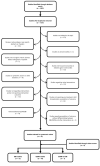Differential Predictors of Response to Early Start Denver Model vs. Early Intensive Behavioral Intervention in Young Children with Autism Spectrum Disorder: A Systematic Review and Meta-Analysis
- PMID: 36358426
- PMCID: PMC9688546
- DOI: 10.3390/brainsci12111499
Differential Predictors of Response to Early Start Denver Model vs. Early Intensive Behavioral Intervention in Young Children with Autism Spectrum Disorder: A Systematic Review and Meta-Analysis
Abstract
The effectiveness of early intensive interventions for Autism Spectrum Disorder (ASD) is now well-established, but there continues to be great interindividual variability in treatment response. The purpose of this systematic review is to identify putative predictors of response to two different approaches in behavioral treatment: Early Intensive Behavioral Interventions (EIBI) and the Early Start Denver Model (ESDM). Both are based upon the foundations of Applied Behavioral Analysis (ABA), but the former is more structured and therapist-driven, while the latter is more naturalistic and child-driven. Four databases (EmBase, PubMed, Scopus and WebOfScience) were systematically screened, and an additional search was conducted in the reference lists of relevant articles. Studies were selected if participants were children with ASD aged 12-48 months at intake, receiving either EIBI or ESDM treatment. For each putative predictor, p-values from different studies were combined using Fisher's method. Thirteen studies reporting on EIBI and eleven on ESDM met the inclusion criteria. A higher IQ at intake represents the strongest predictor of positive response to EIBI, while a set of social cognitive skills, including intention to communicate, receptive and expressive language, and attention to faces, most consistently predict response to ESDM. Although more research will be necessary to reach definitive conclusions, these findings begin to shed some light on patient characteristics that are predictive of preferential response to EIBI and ESDM, and may provide clinically useful information to begin personalizing treatment.
Keywords: applied behavioral analysis; autism spectrum disorder; developmental quotient; early intensive behavioral intervention; early intervention; early start denver model; naturalistic behavioral developmental intervention; predictors; treatment outcome.
Conflict of interest statement
The authors declare no conflict of interest.
Figures
Similar articles
-
Cognitive, behavioral and socio-communication skills as predictors of response to Early Start Denver Model: a prospective study in 32 young children with Autism Spectrum Disorder.Front Psychiatry. 2024 May 30;15:1358419. doi: 10.3389/fpsyt.2024.1358419. eCollection 2024. Front Psychiatry. 2024. PMID: 38873535 Free PMC article.
-
Cognitive, Language, and Behavioral Outcomes in Children With Autism Spectrum Disorders Exposed to Early Comprehensive Treatment Models: A Meta-Analysis and Meta-Regression.Front Psychiatry. 2021 Jul 26;12:691148. doi: 10.3389/fpsyt.2021.691148. eCollection 2021. Front Psychiatry. 2021. PMID: 34381389 Free PMC article.
-
Effects of Parent-Implemented Early Start Denver Model Intervention on Chinese Toddlers with Autism Spectrum Disorder: A Non-Randomized Controlled Trial.Autism Res. 2018 Apr;11(4):654-666. doi: 10.1002/aur.1917. Epub 2018 Feb 7. Autism Res. 2018. PMID: 29412514 Clinical Trial.
-
Cost Offset Associated With Early Start Denver Model for Children With Autism.J Am Acad Child Adolesc Psychiatry. 2017 Sep;56(9):777-783. doi: 10.1016/j.jaac.2017.06.007. Epub 2017 Jul 4. J Am Acad Child Adolesc Psychiatry. 2017. PMID: 28838582 Free PMC article. Clinical Trial.
-
Can the Early Start Denver Model Be Considered ABA Practice?Behav Anal Pract. 2020 Aug 18;14(1):230-239. doi: 10.1007/s40617-020-00474-3. eCollection 2021 Mar. Behav Anal Pract. 2020. PMID: 33732593 Free PMC article. Review.
Cited by
-
Effect of the social environment on olfaction and social skills in wild-type and a mouse model of autism.Transl Psychiatry. 2024 Nov 7;14(1):464. doi: 10.1038/s41398-024-03174-6. Transl Psychiatry. 2024. PMID: 39505842 Free PMC article.
-
Cochlear Implantation in Children with Additional Disabilities: A Systematic Review.Children (Basel). 2023 Oct 5;10(10):1653. doi: 10.3390/children10101653. Children (Basel). 2023. PMID: 37892316 Free PMC article. Review.
-
Racial and ethnic disparities in the co-occurrence of intellectual disability and autism: Impact of incorporating measures of adaptive functioning.Autism Res. 2024 Mar;17(3):650-667. doi: 10.1002/aur.3107. Epub 2024 Feb 28. Autism Res. 2024. PMID: 38415400 Free PMC article.
-
Predicting Communication Skills Outcomes for Preschool Children with Autism Spectrum Disorder Following Early Intervention.Neuropsychiatr Dis Treat. 2024 Jan 8;20:35-48. doi: 10.2147/NDT.S435740. eCollection 2024. Neuropsychiatr Dis Treat. 2024. PMID: 38223372 Free PMC article.
-
Deciphering autism heterogeneity: a molecular stratification approach in four mouse models.Transl Psychiatry. 2024 Oct 4;14(1):416. doi: 10.1038/s41398-024-03113-5. Transl Psychiatry. 2024. PMID: 39366951 Free PMC article.
References
-
- American Psychiatric Association, editor. Diagnostic and Statistical Manual of Mental Disorders: DSM-5. 5th ed. American Psychiatric Association; Washington, DC, USA: 2013.
-
- Huguet G., Benabou M., Bourgeron T. A Time for Metabolism and Hormones. Springer; Berlin, Germany: 2016. The Genetics of Autism Spectrum Disorders; pp. 101–129. - PubMed
-
- Bai D., Yip B.H.K., Windham G.C., Sourander A., Francis R., Yoffe R., Glasson E., Mahjani B., Suominen A., Leonard H., et al. Association of Genetic and Environmental Factors With Autism in a 5-Country Cohort. JAMA Psychiatry. 2019;76:1035. doi: 10.1001/jamapsychiatry.2019.1411. - DOI - PMC - PubMed
Publication types
LinkOut - more resources
Full Text Sources
Miscellaneous


